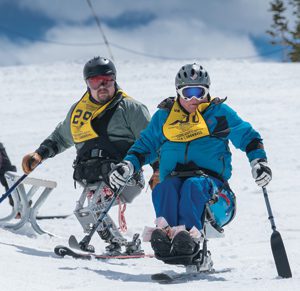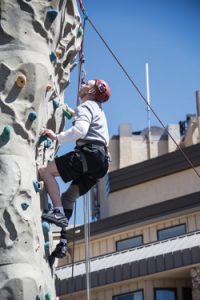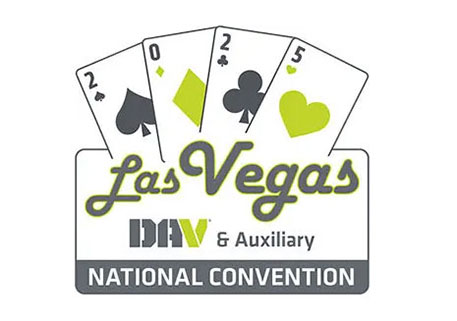Fellow veterans, volunteers key to individual successes at National Disabled Veterans Winter Sports Clinic

Standing behind the lectern during the opening ceremony of this year’s National Disabled Veterans Winter Sports Clinic, National Voluntary Services Director John Kleindienst asked clinic participants to keep an old African proverb in mind during the course of their upcoming adventure.
“If you want to go fast, go alone,” he said. “If you want to go far, go together.”
That adage, along with the clinic’s rightfully earned reputation for delivering miracles on a mountainside, served as a rallying cry for the approximately 400 participants who descended upon Snowmass, Colo., from across the country for the annual five-day event.
Co-hosted by DAV and the Department of Veterans Affairs, the clinic has served as a world leader in adaptive sports for 32 years. It provides veterans with traumatic brain and spinal cord injuries, neurological disabilities, blindness and amputations the opportunity to participate in Nordic and alpine skiing and snowboarding, rock climbing, scuba diving, sled hockey, snowmobiling and a wide range of other activities.
“I usually get forced into [rehabilitative activities for veterans], but then once I’m doing it, I am competitive and glad I got into it,” said Shealynn Casserly, a former Army combat medic who was injured in 2013 by a roadside bomb in Afghanistan.
“I broke my jaw, sustained a traumatic brain injury, a collapsed lung, broken femurs and a lot of internal damage,” said Casserly. “Head to toe, I felt demolished.”
Yet through more than 60 surgeries in the past five years, the Minnesota native said she appreciates any opportunity to take part in winter sports, which is why she focused on snowboarding while in Snowmass.
“I’d like to come back and get more time on the slopes,” she said, before admitting she’s sometimes apprehensive to attend large events with lots of other people—a common sentiment for many of the clinic’s participants.
Regardless, Casserly believes the camaraderie adaptive sporting events has brought into her life has helped her forge bonds with her fellow ill and injured veterans.
“You connect on a totally different level that most people would not understand,” she asserted. “I meet genuine people who become lifelong friends, and that makes it worth it.”
“We want the participants to be impacted by this event for a lifetime,” explained Kleindienst. “We want to plant a seed by introducing them to new opportunities and giving them a chance to prove to themselves that their injuries do not have to limit their quality of life.”
Such opportunities can sometimes be hard to come by for disabled veterans, because not everyone has the same disabilities.

“We strive to make this the best rehabilitative event in the world,” said Teresa Parks, the VA director for the event. “The purpose is to remove any obstacle that stands in their way, because we want veterans to achieve their highest possible potential. If a severely injured veteran has problems standing, we have adaptive equipment that can hold them up. If they need to be seated while they ski, we have the proper equipment for them. If they want to snowboard, we can accommodate that, too.”
Kleindienst and Parks both credit the nearly 650 volunteers and 200 ski instructors with ensuring the clinic’s success.
“None of this could happen without the selfless service of all these amazing people,” Kleindienst said. “It’s truly humbling to come back year after year and see the same smiling faces giving their time so that others can regain a sense of normalcy. There’s a saying that nothing is stronger than the heart of a volunteer. This clinic proves that.”
“We’re truly lucky to have such an outpouring of support from our volunteers and our sponsors,” Parks added. “And one of these best things about it is that their efforts don’t go unnoticed by the participants. They constantly come up to me to let me know how much they appreciate everyone’s efforts, and I think that goes a long way in contributing to the community atmosphere of this event.”
“What makes the clinic so unique is the teamwork you see all around, all day, every day,” said National Headquarters Executive Director Barry Jesinoski. “Volunteers helping participants in every way imaginable, veterans and caregivers sharing their experiences and encouraging each other, and sponsors providing the means for all of it to happen. Whether you’re a participant, volunteer or spectator, you’re going to head home inspired by this one-of-a-kind event.”
And that is what DAV and VA organizers aim for at the National Disabled Veterans Winter Sports Clinic.
“I witnessed veteran after veteran wanting to go far and bringing their fellow veterans with them,” Kleindienst told participants at the event’s close. “Don’t let that end when we leave this mountain.”






